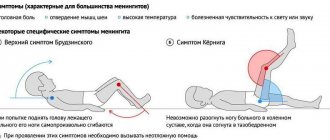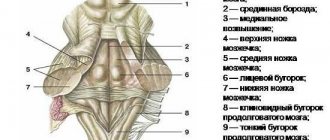Your son is gradually growing up: externally and internally. You can barely keep up with what's happening to him. A lot is changing: from clothes and habits to worldview and attitude towards girls.
The difficult teenage stage is inherent in nature; it cannot be avoided. For some it happens earlier, for others later, but on average, boys begin to transform from a child into a man at the age of 11-12 years.
Believe me, it's not easy for your son right now. Physical illness is superimposed by unstable mental processes and new views on the world around us. If you understand what is happening in your son’s body and can explain it to him, then this stage will be a little easier.
Let's start with physiological changes.
Signs of adolescence
- In boys, adolescence begins with swelling of the testicles, and later the penis and other genital organs enlarge. This occurs on average at 11-15 years of age.
- At the same time, hair appears in the genital area.
- After a couple of years, hair begins to appear on the face and body.
- There is a break in the voice (changes from low to high).
- At the very beginning of maturation, a slight enlargement of the mammary glands may be observed, which disappears after a year or two.
- Night ejaculations.
- Reactions common to both sexes (aggression, inconsistency, fatigue, maximalism).
- The desire to demonstrate one's physical strength.
Boys and girls: relationship difficulties
During puberty, difficulties arise related to the problem of relationships between boys and girls, both within the school and outside its walls, which is caused by sharp external physical and mental differences. Children of the same age are usually taught in the same class with a slight spread, but girls are typically more mature; they are about two years ahead of boys in their development. They are outwardly more developed, taller, and their interests are more mature. Courtship and interpersonal relationships are already interesting, but boys are still just children, they are not interested in girls as an object of the opposite sex, they are still busy with their children's games.
The hardest thing is for those guys whose maturation is inhibited even relative to middle age due to health characteristics, heredity and certain external influences. They are usually the smallest physically in the class, although their comrades are already practically “men,” and this puts psychological pressure.
note
Such guys need support and consolation from their parents even more than girls with similar problems.
During this period, the dynamics of growth and changes in physique, physical strength have a huge influence in the eyes of children. A mistake for parents would be, instead of talking and assuring that everything will begin soon and growth will accelerate, to start visiting doctors looking for problems that do not exist , and asking a specialist to treat the child so that he matures faster. The most reasonable thing is not to interfere with the individual program until the age of 15, and let the programs laid down by nature work.
Puberty
In boys, puberty begins at 13-14 years old and ends at 16-17 years old. The specificity of sexual development is the desire to look older, “cooler,” and to be like one’s idols. They, just like girls, are attracted to the opposite sex. However, they rarely truly fall in love; more often they “play at relationships.”
Gender identification in boys is closely related to the image of a woman nearby. That is, the more female examples there are around, the more the boy realizes his masculinity. The more feminine the girls around him are, the more he feels like a man.
Advice
Each teenager has his own characteristics, both physiological and psychological. But we must remember that they are still children. The age of 12-14 years is considered the most difficult and problematic, as children refuse to listen to any suggestions. Around the age of 17, they calm down and begin to perceive their importance in life. If a son lacks attention, love, care, then he perceives this very painfully. He may become confident that he is indifferent to everyone. Therefore, parents are obliged to behave with their child in such a way that their child cannot doubt their love.
Physical development
The height of boys peaks at 13 (13.5) years - 15 years, and slows down by 18 years. At the same time, weight increases from 14 to 16 years.
Formation of immunity
Adolescence marks the final phase of development of the human immune system. In boys, this occurs at 14-15 years of age. The development of immunity depends on external environmental conditions and heredity. This is why it is important for teenagers:
- eat well and properly;
- exercise;
- avoid bad habits.
The cardiovascular system
There is a gradual increase in blood pressure. The pulse is slightly higher than normal, but lower than in girls. However, like them, headaches, dizziness, and weakness occur.
Muscles
In boys, muscle mass increases at the age of 14, but matching the strength of an adult man is achieved later.
Breath
The respiratory organs are growing. In young men, abdominal breathing predominates. Boys can more easily tolerate shortness of breath during physical activity.
Helping a mother
Problems of adolescence can be avoided, and the mother should help her child with this in many ways, surrounding him with love and care. The father, as a rule, does not babysit the child. Therefore, in adolescence, the child will not feel his affection and tenderness. Mom helps her son with her love and support, because now he urgently needs to feel needed. This is why parents need to be close to their teenage child. Of course, you should be friends with him, but don’t be afraid to be strict if necessary. You can’t let a child, as they say, “sit on your neck.”
If a teenager has problems that he considers serious, then parents should be sensitive and understanding. You cannot laugh at his problems or feelings, as this can lead to the development of complexes. Please note that when experts describe the characteristics of a teenager’s psychological and physical development, they mean the general direction. Therefore, parents need to take into account the individuality and character of their child.
Recommendations for parents
- Of all the elements of puberty, the phenomenon of nocturnal ejaculation can cause the greatest indignation (fear, embarrassment, misunderstanding, uncertainty) in boys. It's important to talk to your son about this. It is important for boys, like girls, to know the features of their reproductive system (in advance).
- If you can’t talk to a teenager about puberty yourself (by the way, believe me, he experiences no less discomfort), then just give him a good book with accessible information. The boy will decide for himself what exactly and when he wants to learn from it.
- Give your teen skin care tips or take them to a dermatologist. Teenagers are very important to their appearance.
- Don’t ignore your teenager’s feelings about his appearance, even if you consider your son ideal. It is important to explain that this is temporary and a person’s appearance is formed anatomically before the age of 20, and later can be easily corrected on their own.
- Don't make the situation worse by shouting about the insignificance of his problems.
- Remember that deviant behavior, which is common in adolescents, is compensation for an inferiority complex. It is important to figure out why a teenager is not confident and help.
- Judge the actions, not the teenager.
- You definitely love it.
- Success largely depends on self-esteem. Self-esteem must be supported from the outside (the task of parents). Believe me, a teenager scolds himself enough and focuses on his shortcomings. Your task, as opposed to noticing only positive aspects. At least focus attention on them.
- Communication with peers and hobbies are very important. If it does not harm the child and society, then let him listen to “creepy” music or look “scary”.
- In terms of restrictions, we need to present a united front. A teenager should not be able to find a “loophole” in the family.
Thus, the task of the parents of a teenage boy is to teach him to act independently, take responsibility for his actions, choose his social circle and life guidelines. It is important to promote the development of positive character traits and reduce the severity of negative ones (or accentuations). To do this, you can conduct conversations, independently research the personality (questionnaires, surveys).
Self-knowledge and self-determination are the basis of age. For boys, self-determination is more focused on professional activities. Often they even strive to find a part-time job. This is good and should not be prevented. But we need to help set adequate priorities and find a compromise together.
However, there is also the opposite option - passivity. Then you need to help your teenager find a hobby.
When interacting with a teenager, it is important to avoid authoritarianism and cruelty, liberalism (“family idol”), overprotection and hypoprotection. These are destructive parenting styles. They have a destructive impact on the relationship between children and parents and their personalities.
The establishment of a friendly cooperative relationship with a teenager will be facilitated by:
- visual and tactile contact (a natural need of all people, often unconscious);
- active listening (voicing the child’s feelings: “you’re upset because you can’t do your homework”);
- pronouncing your feelings, especially negative ones (but not “you upset me,” but “I’m upset,” that is, use I-statements).
Behavior of boys in adolescence
Internal changes greatly affect the behavior of boys.
They:
- become very emotional, even those who were previously calm. All this is accompanied by mood swings: one minute, intense joy can be replaced by intense sadness;
- seek “thrills” and take great risks;
- they begin to pay attention to girls and want to please them;
- begin to consciously approach the choice of clothing and care for their skin;
- react painfully to comments and violently express disagreement;
- they don’t finish what they started, and sometimes they don’t even start what they were talking about;
- get tired quickly;
- become irritable;
- They can do something energetically, and after a couple of minutes they fall onto the bed, exhausted.
Relationships with girls at this age are difficult to build, one of the reasons is that at the age of 11-12 years, girls are larger and stronger than boys. This affects the self-esteem of the children.
Our free book “Men Don’t Cry?!” will help you understand and cope with your son’s emotions. How to raise a boy to be strong and caring."
In general, if you look from the outside at what a teenager wants to be and what he really is, then these are almost two parallel worlds. Inside, the boy is strong, handsome, girls like him and everything works out for him. And on the outside he is still clumsy, disproportionate and with a changing voice.
Literature on the topic
In parting, I want to recommend a couple of books.
- Yu. P. Gippenreiter “Communicate with the child. How?".
- O. V. Kholodkovskaya, V. A. Pashnina “Difficult transitional age: Easy solution to complex problems.”
I advise you to read articles on the same topic: “Transitional age in girls - advice from a psychologist” and “Transitional age and crisis in adolescents - advice from a psychologist.”
Thank you for your attention. I wish you mutual understanding with your children! Listen and you will be heard.
Difficulties
The main problems of adolescence:
- the teenager believes that his rights are being infringed upon, so he restores them through quarrels and scandals with his parents;
- the child feels that he is being treated unfairly. As a result, he tries to prove that he is no longer small and can figure everything out on his own;
- falling in love comes first for him now, and he doesn’t need parents at all (as most teenagers think);
- thoughts of suicide quite often come to the minds of teenagers. Therefore, parents need to do everything so that their child gets this idea out of their heads as soon as possible.
Features of raising boys
A teenager is in many ways like a baby; he is lonely and helpless. Leaving him alone during this period is the same as leaving a newborn unattended.
The main thing you need to do is talk to your teenager.
Democracies and dictatorships are equally ineffective and do not help satisfy the need for communication. As a child grows up, it is important to speak out and be heard. He suffers from misunderstanding and a feeling of loneliness. Even if it doesn't always show it.
Memo for parents of teenage son:
- Take an interest in the child’s social circle, interests, and problems. But don't overdo it. Forget about total control and overprotection.
- Be careful in making value judgments . The child’s appearance, his interests, and friends will most likely not correspond to your ideas. But you just need to understand and accept.
- Be sensitive to feelings. If your grown-up boy has fallen in love for the first time, there is no need to say that all this is nonsense, that now is not the time for such nonsense. Tell us about your first love, give good advice if you care about it. A properly raised boy knows how to treat girls with kindness and respect.
- Personal example. If your family smokes, drinks alcohol, uses foul language, judges, gossips, it is stupid to demand different behavior from a child.
- Always be alert. Parents of teenagers should not relax. The first signs of an emerging problem are poor academic performance and behavior, isolation and other manifestations of depression, alcohol and drug use. There are often cases of violence; the boy can be a victim or a provocateur.
- Be critical of yourself. Admit your mistakes, ask for forgiveness if you were wrong.
- Be honest. Always be responsible for your words, keep your promises.
- Channel excess emotions into a peaceful direction. The boy will choose the sports section in which he will be interested. The key word is himself. Even if it's boxing, rock climbing, skydiving.
- Give the boy the opportunity to feel like a man. Entrust responsible assignments, consult on important issues. And don't scold if something goes wrong.
- Learn to say “no.” Openly declaring your boundaries, saying that this is not acceptable to me is normal. It's not okay to ignore your own interests to please someone else.
To build good, friendly relationships with a teenager, remember yourself at his age. We all grew up, got on our parents’ nerves, and looked for ourselves. Give your child as much time as he needs to open up to you and share his experiences.
How not to raise a boy
You cannot speak disrespectfully to a boy about his father, even if he deserves it. Do not frighten the child with his father's punishment. Due to constant fear, the boy will grow up to be an insecure person.
In families where only the mother or grandmother is in charge of upbringing, and the father is not allowed to participate in the process, the child will not be a real man. He will not be able to make responsible decisions in the future.
So, the transition period for teenage boys of 12 years old requires a special approach to education. Time will pass and they will become young men.
Hobbies
A teenager should have his own hobbies, this will help him realize himself. Many people go in for sports. A teenager can collect stamps, photographs, calendars, etc.
Creative activities can be a favorite activity: writing, drawing, etc. Help your teenager develop his existing abilities.
The boy should be protected from dangerous hobbies associated with bad companies.
Computer and Internet
It is important to know how your child spends time on a social network. What groups is he registered in, with whom and how does he communicate. It is important to do all this unobtrusively.
Make sure your son doesn't sit at the computer in the evening. Fatigue can cause a nervous breakdown.
Teenagers become computer dependent due to nervous disorders and inferiority complex. This is a very dangerous situation that requires the help of a psychologist.
Sports in a boy's life
A twelve-year-old child changes physiologically, his muscles grow, his shoulders become wider. It is important that the boy engages in some kind of sport.
It is better to start choosing a sport between the ages of 5 and 7 years. In this case, by the age of 12, the teenager will already have a useful activity. Swimming, hockey, judo, and athletics are suitable for overweight children. If the child is tall, then he can play volleyball or basketball. Speed and agility are important in football and hockey. The main thing is that the training is beneficial. Teenagers who lead an active lifestyle have fewer problems.
Education
Education is of great importance in raising a teenager. It forms a system of life values. Schoolchildren are taught to accept social responsibility and make the right choice in difficult life situations. Children are prepared for adulthood.
School
School is an important component of a teenager’s social development. It is designed to make the development process less painful for the child himself. Here the teenager learns to communicate and live in a team.
Sometimes a child does not want to go to school. The reasons may be different. For example, he does not see the point in studying or has bad relationships with peers. Explain in a confidential conversation what the consequences may be. Parents should increase motivation to study and set goals together with their child.
If a teenager does not have good relationships in a team, contact a teacher or psychologist. Help solve this problem.
Additional education
Continuing education institutions provide a wide range of interest classes. Some teenagers cannot express themselves in general education, in the classroom. You can develop your hobbies and talents in clubs. A teenager can participate in various competitions and competitions.
Such activities will help increase self-esteem, and even authority in the class. Motivation, self-realization and socialization develop.
Choice of profession
A serious issue in the life of a teenager is the choice of a future profession. Doing something you don't like leads to disappointment and dissatisfaction. Nowadays, it is worth thinking about who the child will be as early as possible. It is necessary to help the teenager decide on the direction of future activities.
Now many schools and even kindergartens have a certain focus. An experienced psychologist will help you make the right choice through testing. The child will be able to develop in accordance with his natural abilities.
By doing something that works and brings satisfaction, the teenager will be able to achieve good results and will feel comfortable and confident in the children's team.
Reasons for changes: what affects puberty
Puberty is a kind of transitional phase between an adult and a child, a difficult physically and psycho-emotionally time. The basis for its development is changes in the balance of hormones, which is triggered by the pituitary gland and supported by the gonads (in the boy, the testicles, partly by the adrenal glands). Due to this, a genetically programmed complex of development is realized: both the body and the nervous system, and the psyche.
The term “puberty” is a purely medical concept; it includes changes occurring in the body, initiated by sex hormones at the body level.
Adolescence (or age) is the period of time in which a boy grows up, and this includes both physical changes and mental and social changes. It lasts longer than the pubertal changes themselves.
The basis of all further changes is initiated by the hypothalamus, which, closer to puberty, enhances the genetically programmed synthesis of a special hormone - gonadotropin releasing factor. This leads to the activation of the work of the pituitary gland - the main “boss” of the peripheral endocrine glands, which gives the command to the genital organs for increased production of sex hormones due to the release of increased concentrations of gonadotropic hormones. The testicles and partly the adrenal glands, under the influence of stimuli from cholesterol molecules, create sex hormones - mainly male - testosterone and androgens, but a small amount of female ones is also important. Sex hormones, in addition to directly affecting the testicles (penis and testicles), have numerous other biological effects in the body. Their manifestation is puberty. This is an evolutionary program - to create a man capable of giving birth to offspring, feeding them and protecting them from death. And this is the development of the reproductive system, muscle strength and skeletal strength, endurance and specific mental characteristics.
The onset of puberty looks like this: the work of the hypothalamus and the activation of the functions of the pituitary gland, forming commands for the genital organs themselves. Along with this, the boy’s body tissues increase their sensitivity to sex hormones, receptors in the gonads mature, the penis and testicles increase in size and weight, and seminiferous tubules develop. Sperm synthesis begins in the area of specific Sertoli cells. As a result, this triggers external changes in the body and changes the psyche.











